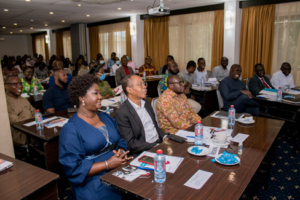The Stanford Seed Transformation Network Ghana (STN), has equipped youth entrepreneurs and business leaders with ethical and critical thinking mindsets to propel their business growth.
The Stanford network in its maiden entrepreneurship learning series designed to help entrepreneurs limit mistakes and uphold good corporate governance and ethical standards that will enable them to compete at the international level brought together seasoned captains of industry to coach and mentor.
The Chief Executive Officer, Automation Ghana Group, Kweku Asmah, taking his turn to share his experience with the hundreds of business owners and entrepreneurs indicated that an organization filled with unethical leaders was most likely to have a very toxic unethical work culture.
He, therefore, urged employees and employers to clearly set out standards and commit to ethical culture in the organization.
 Furthermore, the CEO was very emphatic that leadership by example is not mere rhetoric but a crucial leadership skill that business owners must hold in high esteem because it was always difficult to be ethical when the person you report to behaves unethically and when this becomes the norm in an organization subordinates advise themselves.
Furthermore, the CEO was very emphatic that leadership by example is not mere rhetoric but a crucial leadership skill that business owners must hold in high esteem because it was always difficult to be ethical when the person you report to behaves unethically and when this becomes the norm in an organization subordinates advise themselves.
“Managers and team leaders have a huge role to play in determining whether or not their team members adopt and imbibe a company’s values. There is the need for employees to be on the same page with management and managers have to make them understand what the team was working towards and that the performance goal and objectives could be achieved.
If leaders do not maintain ethical standards and observe the rules, employees lose confidence in the system. They will soon begin to see ethical standards as something written on paper only,” he emphasised.
President of STN Ghana Chapter, Linda Yaa Ampah, on her part touched on the concept for the workshop themed: ‘Influencing teams through ethics and critical thinking.’ She emphasised that this maiden learning series is focused on enhancing the ethical consciousness and critical thinking capacity of business leaders, entrepreneurs, and management.
“This workshop was aimed at providing a platform for management staff of Ghanaian companies to become more aware of their ethical expectations and responsibilities while enhancing their critical thinking.
To enable these companies to succeed, we need to share ideas, information, and experience and build up our knowledge base on the subject of ethics in business which seems least talked about or made integral to company policies, processes, and procedures,” he said.










